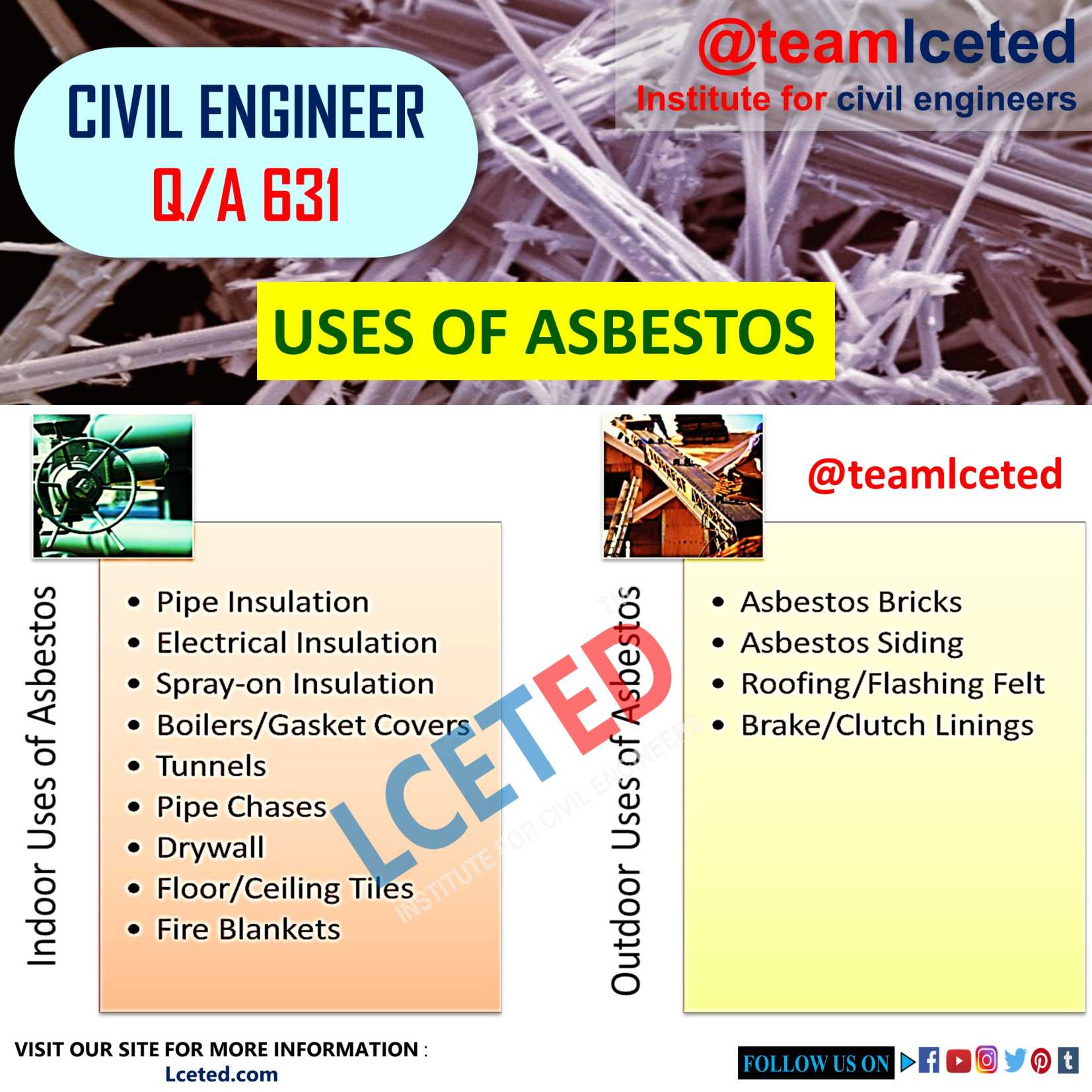ASBESTOS
Asbestos is a naturally occurring fibrous material. It
is a silicate of calcium and magnesium and contains a small amount of iron
oxide and alumina. The original source of asbestos was the mineral fibrous
mineral actinolite.
TYPES OF ASBESTOS
The natural fibre of asbestos
belongs to two groups, viz., those which are readily active with acid (i.e.,
non-acid-resistant) and others that are acid-resistant.
The first group primarily
consists of chrysolite asbestos which is used for industrial purposes. The
second group comprises ammonite and crocidolite asbestos. The second group is
not recommended for commercial use as they are said to cause diseases related
to the lungs. The Indian industry uses the first group asbestos. However, it is
advisable to use asbestos cement products with caution and sufficient care. As
a matter of fact, in some countries, the use of asbestos is not allowed in
buildings.
Asbestos is mixed with
cement and used mostly in the building industry as asbestos cement.
PROPERTIES OF
ASBESTOS
Following are the properties of asbestos:
(i) It has high tensile strength along with fibre.
(ii) It is an excellent insulator for electricity (i.e.,
it is a non-conductor).
(iii) It is incombustible and hence acts as a good
insulator for heat.
(iv) It is acid-proof.
(v) It is flexible, soft and non-porous.
(vi) It is fire-resistant and the melting point is
1200–1500°C.
(vii) It possesses good adhesion with cement and hence
the fibre can be used as a fibre reinforcement.
(viii) It is
rust-free.
(ix) Its specific gravity is 3.10.
(x) It can be easily cut into pieces.
(xi) Its quality is critically affected by the length of
fibres.
(xii) It is smooth like glass and silk.
USES OF ASBESTOS
Following
are some of the uses of asbestos:
(i) Asbestos with cement as asbestos cement have plenty
of uses as sheets and pipes. Sheets are used as roofing material and pipes are
used for drain rainwater, seepage water, etc.
(ii) Asbestos being a good heat insulator, it is used
for insulating furnaces, steam and exhaust pipes, boiler, etc.
(iii) Asbestos being high-temperature resistant, it is
often used for making moulded shapes to resist high temperatures.
(iv) Fire fighting persons use fire-proof suits made of
asbestos.
(v) Asbestos being a good sound insulator, it is used as
small length fibres in different conditions.
(vi) In the form of fibres, asbestos is used for cable
insulation and in sheet form, it is used in lining and partition in switches
and fuse boxes.
(vii) In electric motors and coils exposed to high
temperatures, asbestos paper is used as a cover for electric wires.
(viii) Asbestos felt is used as a damp proof layer in
combination with bitumen.
(ix) Asbestos is used for internal combustion engine
exhaust pipes and silencer gaskets and sparkling plug washers in combination
with copper shell.
(x) Asbestos, when powdered or in the form of fibres, is
sometimes kneaded into a dough form with water and used for blocking holes and
cracks in metal objects.
(xi) In combination with magnesium carbonate, or wool
felt, it is used for lagging steam pipes.
(xii) It is used to form asbestos paints.
PRODUCTS OF ASBESTOS
Some of the products of asbestos which are manufactured
are discussed below.
1. Asbestos Boards
Asbestos fibres and Portland cement are mixed and
moulded under hydraulic pressures. These are available in board and sheet
forms. Some of the commercial forms are claddings, roofing and decking units.
Asbestos boards are available in natural mottled grey colour
and pigmented boards are also marketed. Boards are dense and rigid but workable
easily using carpenter’s tools. These boards can withstand temperatures up to
540°C.
Asbestos boards are marketed in two sizes, viz., Class
A: thickness = 6.5 mm and width = 1.2 mm; Class B: thickness = 5.0 mm and width
= 1.2 mm.
Asbestos boards are economical and completely
incombustible. They can take up paints of any shade economically. These are
easily workable and durable.
2. Asbestos Sheets
Asbestos sheets are flat and are classified as compressed and uncompressed. Compressed sheets are of minimum thickness unit which can withstand bending stress of 22 N/mm2 with a density of 1600 kg/m3, whereas uncompressed units can withstand bending stress of 16 N/mm2 with a density of 1200 kg/m3. Corrugated types of sheets are with thickness varying from 4.76 to 6.35 mm and the corrugation has a pitch of 10 cm and the weight being 145 N/m2.
Asbestos sheets are used for wall-lining,
wall-panelling, partitions, side-cladding and false ceilings. Also used for
wardrobes, cupboards and kitchen-pantry shelves. Blackboards, hoardings,
signboards, window panes and door panels are also of asbestos sheets.
3. Asbestos Cement Pipes
These pipes are made using 15–20% of asbestos fibres,
80–85% of cement and water. Pipes of different sizes, bands, functions, taper
pipes, shoes, etc., are also manufactured to the required shape and size. They
can be easily cut and need no paint to maintain.
These pipes claim several advantages because of its adaptability,
easy installation, and are light, strong and can withstand normal handling.
Asbestos cement pipes are used as rainwater pipes,
valley gutters, soil waste and ventilating pipes, half-round gutters, etc.
4. Asbestos Paint
It is prepared by the addition of finely ground asbestos
to oil paint or distemper. It is highly fire-resistant, heat and sound
insulation. It is vermin-proof and prevents corrosion of metals.
5. Asbestos Fibres
Asbestos is also available in fibre form in the market.
These fibres have adequate strength and flexibility and are used in making
conveyor belts, boiler insulation, brake lining, etc.
If you find
This information is helpful, please share it.
Thanks! For reading the article.









No comments:
Post a Comment